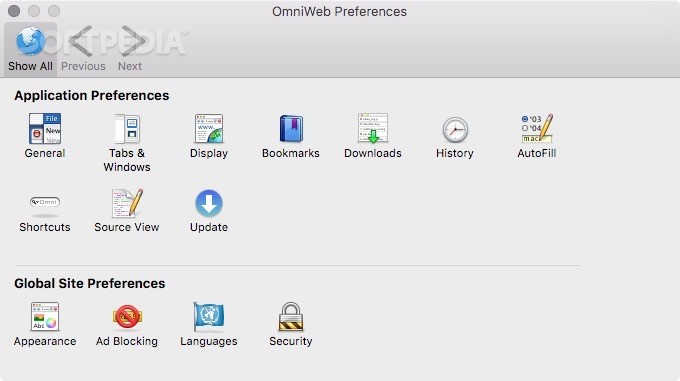

- OMNIWEB FOR OPENSTEP DOWNLOAD HOW TO
- OMNIWEB FOR OPENSTEP DOWNLOAD PATCH
- OMNIWEB FOR OPENSTEP DOWNLOAD SOFTWARE
- OMNIWEB FOR OPENSTEP DOWNLOAD PASSWORD
- OMNIWEB FOR OPENSTEP DOWNLOAD ISO
OMNIWEB FOR OPENSTEP DOWNLOAD HOW TO
There’s some code that shows how to interact with this kind of disc label - maybe in the future I could put together some code to read the CD like I did for SGI EFS? For now, though, I’m going to try loading the disc image in to my SCSI2SD “fake” CD-ROM drive. So, this is a non-standard format specific to NeXT. As luck would have it, those bytes do show up in sys/sys/bootblock.h: 0圆46c5633 is NEXT68K_LABEL_CD_V3. Since NetBSD focuses on compatibility with the widest possible set of hardware, they often have compatibility for far-out things. When trying to find “magic numbers” like this, I usually check out the NetBSD sources. What format is it? The first few bytes of a disk image usually can help figure that out: head -c 16 nextstepdeveloper3.3.iso | hexdumpĠ000000 64 6c 56 33 00 00 00 00 00 00 00 00 4e 45 58 54
OMNIWEB FOR OPENSTEP DOWNLOAD ISO
Were this been an actual ISO image, I might have mounted it on my laptop and copied the files to my NAS to make the installer available to the workstation unfortunately, it’s not. I grabbed the Developer disc image from the Internet Archive. While there were separate versions of NeXTstep User for CISC (m68k and i386) and RISC (PA-RISC and SPARC) platforms, the Developer disc is “quad-fat” - it contains binaries for all four platforms. What’s next for making a usable system? Developer tools! NeXTstep came on two sets of discs - “User” for the main operating system, and the optional “Developer” disc with compilers, GUI building tools, libraries, and documentation. To set a password, you go to Preferences.app and navigate to the lock icon.Īfter a reboot, I’m on the most recent version of NeXTstep for PA-RISC, and ready for the year 2000! Getting access to dev tools
OMNIWEB FOR OPENSTEP DOWNLOAD PASSWORD
In order to do that, I need to give the me user a password so the system will stop automatically logging in at boot (giving me a chance to log in as root). System updates need to be installed as the root user, and if you run them as me (the default user) NeXTstep doesn’t prompt to escalate privilges, it just gives an error. Because I’m using an HP PA-RISC machine, I need NS33RISCUserPatch3.tar.
OMNIWEB FOR OPENSTEP DOWNLOAD PATCH
generously hosts the patch for download. The third patch is a cumulative update, so that should be all I need. Since NeXT were acquired by Apple in 1997, this patch was made by Apple to address Y2k bugs and other longstanding issues. NeXTstep 3.3 was released in mid-1995, and it had three patch updates: the first at the end of 1995, and the second and third in late 1999. The first order of business is to run system updates. That’s it? A lot of struggle got me to this point, but finally I can transfer files. With that in mind, I (naively) attempted to use the “SimpleNetworkStarter” application. That’s all well and good - in the early 1990s that space had many competitors and a “right path” hadn’t yet been established, but… I don’t want my machine to be part of a directory, **I just want it to be on my existing TCP/IP network. Which is to say: NetInfo is a “directory services” system. serve this information in a highly-available manner.quickly bring new machines in to the network.control permissions around access to network resources.manage user accounts that would work across all machines.If you had a collection of NeXT computers on a network, NetInfo gave you a system to: The cornerstone of NeXTstep networking was NetInfo. In a surprise to exactly no one, NeXTstep, being from a company founded by Steve Jobs, had it’s own NeXT-only ecosystem of tools that fit together amazingly well. Hang on a second: NeXTstep is a workstation-focused Unix operating system from the 80s-90s - how could it be difficult to get it on a network? The answer is a thing called NetInfo. NARRATOR: she did not soon win the fight with NFS and NetInfo
OMNIWEB FOR OPENSTEP DOWNLOAD SOFTWARE
I think I'm done for the day but soon if I can fight with NFS and NetInfo (lolololol) I can get screenshots off it and software on- cron mom February 10, 2018 I was initially optimistic that I would figure it out: The OS installed OK, but I ran in to trouble with networking. I first tried out NeXTstep on this workstation a couple years ago.

While it is possible to transfer files from SCSI drives (or even floppies!), getting a pizzabox on my home network makes loading software much easier. My goal is to end up with a capable machine that I can use like it might have been when new, and learn from the experience.


 0 kommentar(er)
0 kommentar(er)
